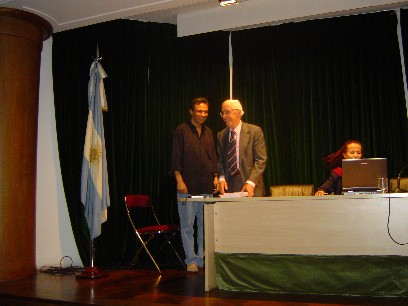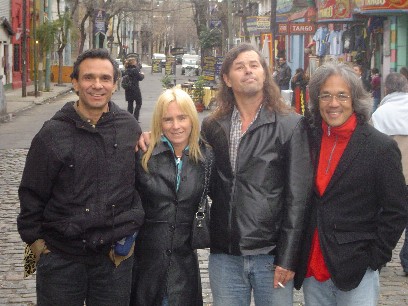|
Feature:
REFORMA
Issues
the
Buenos
Aires
Declaration,
Eyes
2008
Vienna
UN
Session
9/16/05
https://stopthedrugwar.org/chronicle-old/403/buenosaires2.shtml
In parallel with the two
series of panels that comprised the 1st Latin American Conference on Drug
Policy Reform -- the general discussions on drug reform in Latin America
and the meetings of legislators and judges on the topic -- the umbrella
grouping of Latin American anti-prohibitionist organizations, REFORMA,
held a series of meetings during the conference to plot strategy at both
the national and international levels. (With Jamaica NORML's Paul
Chang joining the REFORMA executive committee, the group will henceforth
refer to itself as a Latin American and Caribbean anti-prohibitionist organization.)
 |
|
| Luiz Paulo Guanabara and Gustavo de Greiff |
|
Representing Latin America
and the Caribbean were, among others, conference hosts the Argentine
Harm Reduction Association, the Brazilian harm reduction group Aborda,
the Brazilian organization Psicotropicus,
honorary head former Colombian attorney general Gustavo de Greiff, the
Colombia-centered group Mama Coca,
Jamaica NORML, and the Uruguayan harm reduction group El Abrojo.
The working group also included Marco Perduca representing the International
Antiprohibitionist League, Joep Oomen representing the European
Coalition for Just and Effective Drug Policie, and Phillip Smith of
the US-based Drug Reform Coordination Network (DRCNet),
also a frankly anti-prohibitionist organization.
In the REFORMA meetings,
which occurred before, after, and in between the conference's official
sessions, participants hammered out a strategy and plan of action for attacking
the legal backbone of global drug prohibition, the series of three United
Nations conventions, or treaties, that establish drug prohibition as global
policy and which constrain individual nations from deviating from the prohibitionist
norms. Those treaties and their effectiveness will be up for review
at the special meeting of the UN General Assembly in Vienna in 2008.
Under the conventions, any
given country cannot, for example, legalize marijuana without being in
breach of the conventions. The necessity of adhering to the conventions
is why Holland never officially ended marijuana prohibition even though
it is now observed mostly in the breach, at least when it comes to the
country's famous cannabis coffee shops.
The REFORMA meetings elaborated
a list of actors to target ranging from national governments -- it is only
they who have votes at the UN -- to parliamentarians at the national and
regional levels, local authorities, scientific experts, the press, and
celebrities. Religious leaders were also mentioned, although their
significance appeared to escape representatives from secular Europe.
These people and institutions
will be targeted by REFORMA and its constituent groups in their respective
countries in an effort to demand that countries undertake an evaluation
of the impact of current prohibitionist drug policies at the national level.
With these comprehensive studies completed, critics of the conventions
will be able to present them in Vienna in a challenge to drug war orthodoxy.
REFORMA "must activate and
animate" local authorities, such as friendly mayors or health department
heads, said ARDA's Silvia Inchaurraga.
"We have two and half years
before Vienna, and we need to get busy now," said the IAL's Marco Perduca.
|
 |
|
Phil Smith, Luiz Paulo Guanabara, Silvia Inchaurraga, Paul Chang
|
With plans underway to hold
another Latin American drug reform meeting next year in Brazil, the REFORMA
agenda and timelines will continue to evolve, with changing the UN conventions
being the primary, but not sole, concern of the hemispheric umbrella group.
But REFORMA still has work
to do in creating a hemispheric movement. Several major Latin American
countries were not represented, notably Cuba and Venezuela, while Mexico's
presence was limited to de Greiff, who has made his home in Mexico City
for a number of years since serving as Colombia's ambassador. While
other countries, including Ecuador, Paraguay, the Central American states
and the Guyanas were not present either, REFORMA will concentrate its efforts
on the first three.
As the last official act
of the 1st Latin American Conference on Drug Reform, REFORMA members agreed
to and presented "The Buenos Aires Declaration" formally rejecting the
UN conventions and war on drugs-style drug policies, and demanding that
national governments embark on rigorous studies of the effect of prohibitionist
policies at the national level in time for Vienna in 2008.
"The Buenos Aires Declaration
on Drug Policy Reform shows the core of the REFORMA platform and action
plan from 2005 to 2008," said Inchaurraga, who sits on the group's executive
committee. "Since the creation of the Latin American network in Popayan,
Colombia, one year ago, we in the executive we have been discussing ideas
to strengthen the anti-prohibitionist movement in Latin America by bringing
together different problems related to the war on drugs, including those
of drug users, producers, peasants and institutions."
Below is the Buenos Aires
Declaration in its entirety:
The Buenos Aires Declaration
on Drug Policy Reform
The REFORMA network, meeting
on September 7-9, 2005, in Buenos Aires has agreed to issue this document.
Whereas:
-
Prohibitionist policies have
failed worldwide, with this failure signifying grave problems for citizens,
organizations, producers, peasants, and drug users;
-
Prohibitionist policies have
also failed in their effort to control and reduce the supply and demand
for drugs
-
Latin America shows significant
signs of political, institutional, police, and judicial corruption, the
criminalization of users, the demonization of plants, etc.;
-
Alternative approaches have
had to and must confront significant obstacles and are in many cases neutralized,
as is reflected in the reality that countries that have made progress with
harm reduction strategies in the region have usually been associated with
the prevention of HIV/AIDS and anti-prohibitionist organizations have not
received official support;
-
It is urgent that the agendas
of harm reduction not be reduced to the prevention of the transmission
of HIV/AIDS but that they include the social, political, and institutional
harms associated with phenomenon like police and judicial corruption, urban
and institutional violence, and the weakening of individual rights as well
as environmental and cultural harms;
-
It is necessary to involve health
and legal experts, governments, the means of communications, economists,
and leaders in general to demand the reform of drug policies in Latin America;
-
The war on drugs has diverted
80% of the billions of dollars appropriated for the issue toward warlike,
repressive, and overwhelmingly police-military ends when this immense amount
of resources should have been made available for prevention, aid, and health
promotion for the affected populations and the preservation of ecosystems;
-
It is absolutely necessary that
actions are coordinated so that human rights includes access to health
and information and guarantees of social justice and preservation of the
environment.
We resolve:
-
To denounce the harms created
by Latin American governments aligning themselves with the policy of a
war against drugs, which has been transformed into a war against the ecosystem,
plants, indigenous people, peasants, drug users and even anti-prohibitionist
thinkers, maximizing social exclusion and the harms derived from the criminalization
of poverty;
-
To demand from our governments
a rigorous study of the effects and impact of the drug policies that have
implemented to this time and a study of the costs of executing these policies
to reject the international treaties on drugs;
-
To convoke a group of specialists
from the region to form a committee of advisors to REFORMA that will accompany
us in creating a document for the United Nations Commission on Drugs in
2008;
-
To call on local and national
authorities, professionals, the mass media, and drug user and peasant producer
networks to join in the 2nd Latin American Conference on Drug Policy Reform
to be held in 2006 in Brazil;
-
To contribute to preserving
the human rights of peasants, indigenous people, and drug users beginning
with the need to reduce the harms of mistaken policies that have overwhelmingly
failed in Latin America, and to support the development and strengthtening
of harm reduction in Latin America and campaigns and initiatives for the
necessary legislative reforms in the region;
-
To reject public policies that
are not in accord with Latin American cultures and traditions, en particular
those of indigenous peoples;
-
To reaffirm the ritual, traditional,
and medicinal uses of substances like coca leaf and marijuana, and to contribute
to the diffusion of scientific evidence in the matter;
-
To conceive drug users as citizens
and defend their role as protagonists as health agents in harm reduction
programs;
-
To defend the rights of individuals
over their own lives and bodies as well as the right of free expression
and the right to information about drugs;
-
To push for the decriminalization
of drug possession for personal use, home growing for personal use, and
the legalization of marijuana for therapeutic use as perfectly viable proposals
for the medium term in Latin America;
-
To open the debate over the
alternatives of open and controlled legalization through forums with international
specialists and the establishment of working links with other anti-prohibitionist
organizations around the world;
-
To reject the current UN conventions
on drugs and the proposals for alternative development as violations of
the sovereignty of signatory states, and to appeal for the defense of the
sovereignty of peoples over their legal systems;
-
The demilitarization of the
anti-drug agencies and the redistribution of those resources in the field
of drug control from the police-court ambit to the areas of health and
education.
-- END --
|
Issue #403
-- 9/16/05
Feature:
Judges
and
Legislators
from
Across
Latin
America
Call
for
Radical
Drug
Law
Reform
|
Feature:
REFORMA
Issues
the
Buenos
Aires
Declaration,
Eyes
2008
Vienna
UN
Session
|
Feature:
Cannabis
Culture
in
Buenos
Aires
--
Alive
and
Smokin',
But
With
One
Eye
Peeled
for
the
Police
|
Europe:
Former
Scottish
High
Court
Judge
Says
Legalize
It
|
Weekly:
This
Week's
Corrupt
Cops
Stories
|
Canada:
Liberals
Give
Up
on
Marijuana
Decriminalization
Bill
for
Now
|
Health
Canada
Revisits
Proposal
to
Distribute
Medical
Cannabis
in
Licensed
Pharmacies
|
Latin
America:
In
Continuing
Spat,
US
Decertifies
Venezuela
for
Lack
of
Anti-Drug
Cooperation
|
Web
Scan:
Cato
Pain
Forum,
Slate
on
Rehnquist
and
Placidyl,
Alternet
on
the
Marijuana
War,
NORML
Video
Blog
|
Weekly:
This
Week
in
History
|
Weekly:
The
Reformer's
Calendar
|
|
This issue -- main page
This issue -- single-file printer version
Drug War Chronicle -- main page
Chronicle archives
|
PERMISSION to reprint or
redistribute any or all of the contents of Drug War Chronicle (formerly The Week Online with DRCNet is hereby
granted. We ask that any use of these materials include proper credit and,
where appropriate, a link to one or more of our web sites. If your
publication customarily pays for publication, DRCNet requests checks
payable to the organization. If your publication does not pay for
materials, you are free to use the materials gratis. In all cases, we
request notification for our records, including physical copies where
material has appeared in print. Contact: StoptheDrugWar.org: the Drug Reform Coordination Network,
P.O. Box 18402, Washington, DC 20036, (202) 293-8340 (voice), (202)
293-8344 (fax), e-mail [email protected]. Thank
you.
Articles of a purely
educational nature in Drug War Chronicle appear courtesy of the DRCNet
Foundation, unless otherwise noted.
|


